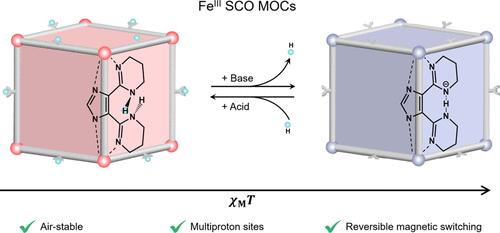当前位置:
X-MOL 学术
›
J. Am. Chem. Soc.
›
论文详情
Our official English website, www.x-mol.net, welcomes your feedback! (Note: you will need to create a separate account there.)
Proton-Induced Reversible Spin-State Switching in Octanuclear FeIII Spin-Crossover Metal–Organic Cages
Journal of the American Chemical Society ( IF 14.4 ) Pub Date : 2024-07-23 , DOI: 10.1021/jacs.4c07469 Zhi-Kun Liu 1 , Xue-Yang Ji 2 , Meng Yu 1 , Yu-Xia Li 1 , Jie-Sheng Hu 1 , Yu-Meng Zhao 1 , Zi-Shuo Yao 1 , Jun Tao 1
Journal of the American Chemical Society ( IF 14.4 ) Pub Date : 2024-07-23 , DOI: 10.1021/jacs.4c07469 Zhi-Kun Liu 1 , Xue-Yang Ji 2 , Meng Yu 1 , Yu-Xia Li 1 , Jie-Sheng Hu 1 , Yu-Meng Zhao 1 , Zi-Shuo Yao 1 , Jun Tao 1
Affiliation

|
Responsive spin-crossover (SCO) metal–organic cages (MOCs) are emerging dynamic platforms with potential for advanced applications in magnetic sensing and molecular switching. Among these, FeIII-based MOCs are particularly noteworthy for their air stability, yet they remain largely unexplored. Herein, we report the synthesis of two novel FeIII MOCs using a bis-bidentate ligand approach, which exhibit SCO activity above room temperature. These represent the first SCO-active FeIII cages and feature an atypical {FeN6}-type coordination sphere, uncommon for FeIII SCO compounds. Our study reveals that these MOCs are sensitive to acid/base variations, enabling reversible magnetic switching in solution. The presence of multiple active proton sites within these SCO-MOCs facilitates multisite, multilevel proton-induced spin-state modulation. This behavior is observed at room temperature through 1H NMR spectroscopy, capturing the subtle proton-induced spin-state transitions triggered by pH changes. Further insights from extended X-ray absorption fine structure (EXAFS) and theoretical analyses indicate that these magnetic alterations primarily result from the protonation and deprotonation processes at the NH active sites on the ligands. These processes induce changes in the secondary coordination sphere, thereby modulating the magnetic properties of the cages. The capability of these FeIII MOCs to integrate magnetic responses with environmental stimuli underscores their potential as finely tunable magnetic sensors and highlights their versatility as molecular switches. This work paves the way for the development of SCO-active materials with tailored properties for applications in sensing and molecular switching.
中文翻译:

八核 FeIII 自旋交叉金属有机笼中质子诱导的可逆自旋态转换
响应性自旋交叉(SCO)金属有机笼(MOC)是新兴的动态平台,在磁传感和分子开关方面具有先进应用的潜力。其中,Fe III 基 MOC 因其空气稳定性而特别值得注意,但它们在很大程度上仍未被开发。在此,我们报告了使用双齿配体方法合成了两种新型 Fe III MOC,它们在室温以上表现出 SCO 活性。这些代表了第一个 SCO 活性 Fe III 笼,并具有非典型的 {FeN 6 } 型配位球,这在 Fe III SCO 化合物中并不常见。我们的研究表明,这些 MOC 对酸/碱变化敏感,从而能够在溶液中实现可逆的磁切换。这些 SCO-MOC 中存在多个活性质子位点,有利于多位点、多级质子诱导的自旋态调制。这种行为可以在室温下通过 1 H NMR 光谱观察到,捕获由 pH 变化触发的微妙质子诱导的自旋态转变。扩展 X 射线吸收精细结构 (EXAFS) 和理论分析的进一步见解表明,这些磁性变化主要是由配体上 NH 活性位点的质子化和去质子化过程引起的。这些过程引起二次配位球的变化,从而调节笼的磁性。这些 Fe III MOC 将磁响应与环境刺激相结合的能力强调了它们作为精细可调磁传感器的潜力,并强调了它们作为分子开关的多功能性。这项工作为开发具有适合传感和分子开关应用的定制特性的 SCO 活性材料铺平了道路。
更新日期:2024-07-25
中文翻译:

八核 FeIII 自旋交叉金属有机笼中质子诱导的可逆自旋态转换
响应性自旋交叉(SCO)金属有机笼(MOC)是新兴的动态平台,在磁传感和分子开关方面具有先进应用的潜力。其中,Fe III 基 MOC 因其空气稳定性而特别值得注意,但它们在很大程度上仍未被开发。在此,我们报告了使用双齿配体方法合成了两种新型 Fe III MOC,它们在室温以上表现出 SCO 活性。这些代表了第一个 SCO 活性 Fe III 笼,并具有非典型的 {FeN 6 } 型配位球,这在 Fe III SCO 化合物中并不常见。我们的研究表明,这些 MOC 对酸/碱变化敏感,从而能够在溶液中实现可逆的磁切换。这些 SCO-MOC 中存在多个活性质子位点,有利于多位点、多级质子诱导的自旋态调制。这种行为可以在室温下通过 1 H NMR 光谱观察到,捕获由 pH 变化触发的微妙质子诱导的自旋态转变。扩展 X 射线吸收精细结构 (EXAFS) 和理论分析的进一步见解表明,这些磁性变化主要是由配体上 NH 活性位点的质子化和去质子化过程引起的。这些过程引起二次配位球的变化,从而调节笼的磁性。这些 Fe III MOC 将磁响应与环境刺激相结合的能力强调了它们作为精细可调磁传感器的潜力,并强调了它们作为分子开关的多功能性。这项工作为开发具有适合传感和分子开关应用的定制特性的 SCO 活性材料铺平了道路。












































 京公网安备 11010802027423号
京公网安备 11010802027423号